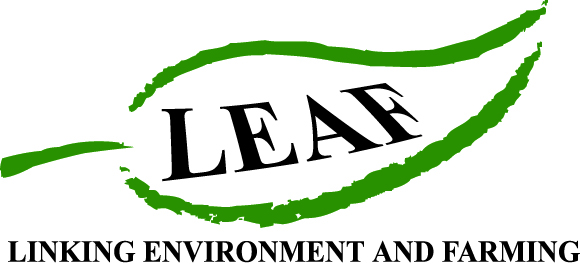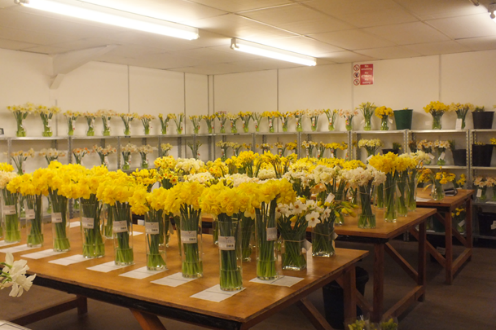 On July 15th, LEAF headed down to Penwith to check out Varfell Farms who will be joining the national LEAF Demonstration Farm Network in 2022 as a legacy of the Penwith Landscape Partnership horticulture project being run by LEAF, as part of our Farming Futures project. Just before the relaxation of social distancing guidelines and too good a farming day to summon up a wider audience, Farms Directors Simon and Sylvie never the less demonstrated a great tour for LEAF and Cornwall Wildlife Trust, laying pipe for future events as part of the Network.
On July 15th, LEAF headed down to Penwith to check out Varfell Farms who will be joining the national LEAF Demonstration Farm Network in 2022 as a legacy of the Penwith Landscape Partnership horticulture project being run by LEAF, as part of our Farming Futures project. Just before the relaxation of social distancing guidelines and too good a farming day to summon up a wider audience, Farms Directors Simon and Sylvie never the less demonstrated a great tour for LEAF and Cornwall Wildlife Trust, laying pipe for future events as part of the Network.
For those of you unfamiliar with Varfell Farms, based at Long Rock, it boasts some fantastic stats. The first being that it produces over 40% of the world’s cut daffodils on 1,200ha of West Cornwall, and the second that it holds around 40% of the daffodil bulbs in the world across 200 varieties! Capitalising on the unique climate of the region, successional cutting of over 500m stems runs from December through March, with 7,000t of bulbs lifted between June and August for replanting and retail sale. And it’s not just daffs - over 3.6m summer stems including agapanthus, brodiaea and peonies head out from the farm annually to brighten up bouquets across Britain.
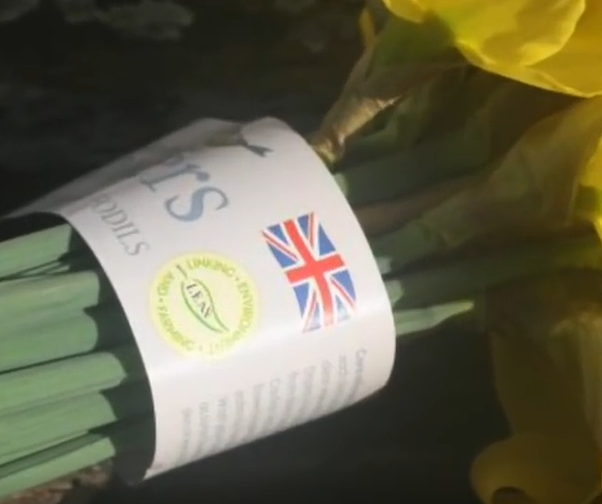 A LEAF Marque certified business since 2012, Varfell employs over 40 full time staff, with the seasonal workforce topping 800 at peak times. A member of the Groesn group of companies that include Pro-Force, Varfell’s vertically integrated system encompasses innovation, packing and dispatch, making it unusually resilient to volatile markets. The site has benefited from significant investment over the past 10 years, bringing world class facilities to every stage of the process. A focus on regenerative agricultural practices underpinned by the assertion that ‘what is better for nature is better for farm profitability’ has boosted soil and plant health, reduced erosion and runoff, and cut input costs.
A LEAF Marque certified business since 2012, Varfell employs over 40 full time staff, with the seasonal workforce topping 800 at peak times. A member of the Groesn group of companies that include Pro-Force, Varfell’s vertically integrated system encompasses innovation, packing and dispatch, making it unusually resilient to volatile markets. The site has benefited from significant investment over the past 10 years, bringing world class facilities to every stage of the process. A focus on regenerative agricultural practices underpinned by the assertion that ‘what is better for nature is better for farm profitability’ has boosted soil and plant health, reduced erosion and runoff, and cut input costs.
We met, with delicious cake from St. Buryan Farm Shop, in the cool shade of the barn out of the height of summer sun, with bunches of brodiaea on well-spaced picnic tables. A lively discussion on current thinking around best practice in diverse swards and cover crop mixes followed a short film around how Integrated Farm Management (IFM) has been supporting regenerative agricultural practices for 30 years (you can watch it here). With farmers busy on the land, we set off to tour the site with an eye to appreciating IFM in action at scale and looking at the practicalities of Varfell as a hub for demonstration, learning and knowledge exchange.
First port of call was the new worker housing, a radical upgrade undertaken since 2018 to consolidate accommodation on site and part of a comprehensive programme to improve worker welfare and related productivity. With the busiest months being through the darkest days of winter, the provision of transport, free laundry, good water pressure, hi-vis clothing, excellent wifi and a clean, pleasant living environment has proved a crucial strategy to 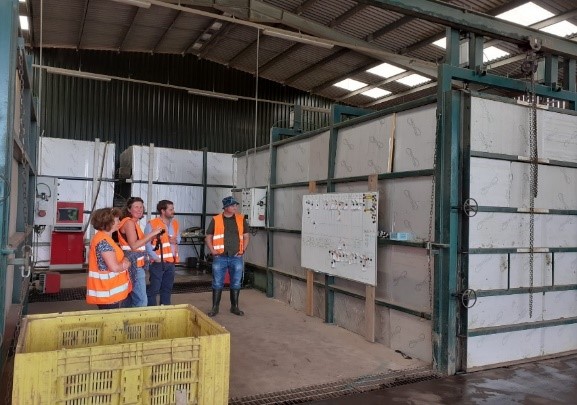 attracting and retaining valuable workers in a year where the sector as a whole has struggled with this vital resource. Working with the local community to build positive relationships across the year informs decision making on worker transport, facilities and communications, and includes cut price farm gate sales of seasonal blooms.
attracting and retaining valuable workers in a year where the sector as a whole has struggled with this vital resource. Working with the local community to build positive relationships across the year informs decision making on worker transport, facilities and communications, and includes cut price farm gate sales of seasonal blooms.
The bulb sterilising operation was next - a bank of shipping container sized tanks filled to the brim with water (and a dash of disinfectant) that is heated to 40 degrees for 3 hours to ensure bulbs destined for replanting for their next 5 year slot in the rotation are free from fusarium pathogens and nematodes. Historically, the process involved formaldehyde, a toxic compound that poses significant risk of pollution. By optimising the hot water sterilisation process, input costs have been cut and risks to both operatives and the surrounding environment eliminated. Once removed from the hot water tanks the bulbs, meticulously tracked in graded variety batches, are air dried ready for replanting.
Finally, we headed to the beautiful agapanthus field, one of several scattered across the farms estate. Staying productive for up to 20 years, the significant acreage maintained by Varfell make the company the primary UK commercial producer of this elegant stem. Also contributing a diversification to the annual labour profile the crop gives consistency to a handful of year round 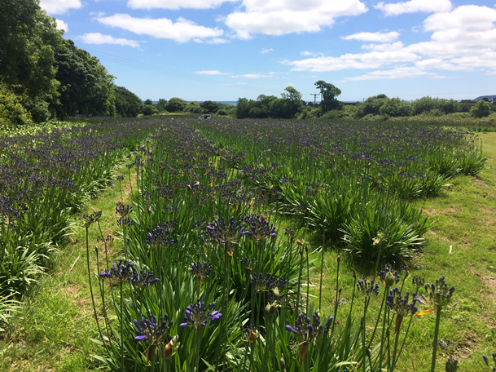 pickers. A novel approach to weed management, in crop grazing by sheep is made possible by making the most of the unpalatability of the plants. This also allows for green cover to be retained between rows, again reducing the risk of soil erosion and diffuse pollution through runoff in heavy rain.
pickers. A novel approach to weed management, in crop grazing by sheep is made possible by making the most of the unpalatability of the plants. This also allows for green cover to be retained between rows, again reducing the risk of soil erosion and diffuse pollution through runoff in heavy rain.
Overall, Simon and Sylvie gave us a great demonstration of how all elements of a growing system work together to optimise not just environmental but also social and economic sustainability. We look forward to returning to learn more about other aspects of the regenerative farming strategy that is being actioned across the business - a diverse rotation including cover cropping elements carefully designed to enhance soil health; controlled traffic farming to minimise soil compaction; reduced tillage to promote beneficial microbes and fungi. We will aim for worse weather next time to allow for more farmers to join us!
